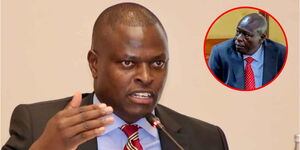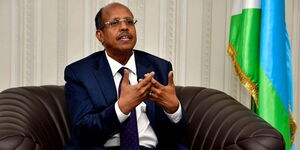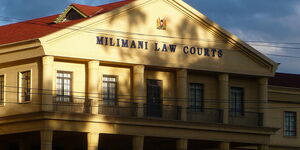National Assembly Speaker Moses Wetang’ula has come to the defence of President William Ruto over the recent nominations of a new chairperson and commissioners of the Independent Electoral and Boundaries Commission (IEBC).
While speaking on Sunday in Tinderet, Nandi County, Wetangula clarified that the incoming chairperson and commissioners were not selected by the president.
Rather, the National Assembly Speaker said President Ruto's role was simply that of a pathway and that Parliament has the ultimate powers to decide who oversees the next polls.
"The President is not appointing Commissioners; he is simply part of a constitutional process,” said Wetang’ula, adding, “Parliament has the ultimate authority to either approve or reject the nominees. Let us not fall into the habit of opposing everything simply because it wasn’t our idea.”
On Thursday, Ruto nominated Erastus Edung Ethekon from Turkana County as the chairperson. Additionally, the president has nominated six other individuals to serve as members of the commission and submitted their names to Parliament for vetting.
This move was met by resistance from the new-look opposition, led by Wiper Party leader Kalonzo Musyoka, who accused the President of solely appointing new commissioners against the NADCO report.
Kalonzo, while insisting the President can't be the player and pick the referee, claims to have written to Ruto and Raila as a principal during NADCO, but did not receive a response.
“You cannot be a player and pick a referee. I have written to Ruto and Raila Odinga as a principal during NADCO, and I have not received any response. We are not going to allow this thing to be easy," the Wiper Party leader said.
But Wetangula, in a rejoinder, aimed a subtle dig at the opposition by calling on anyone with grievances regarding the new nominees to take it up with the Justice and Legal Affairs Committee (JLAC) of Parliament.
Under Article 250(2)(b) of the Constitution, the names of nominees of independent commissions must be submitted to the National Assembly for vetting. which is handled by the JLAC, which then submits a report with recommendations, either to approve or reject the nominees.
Thereafter, the National Assembly will debate the committee's report to determine whether to approve or reject the nominees through a simple majority vote.
In the unlikely event a nominee is rejected, President Ruto will have to submit a new nominee, and the process will start over again. If accepted, the president will formally appoint the nominees through a gazette notice.












